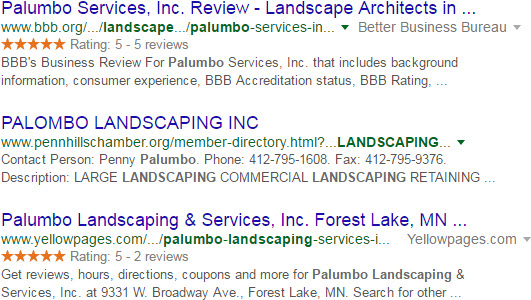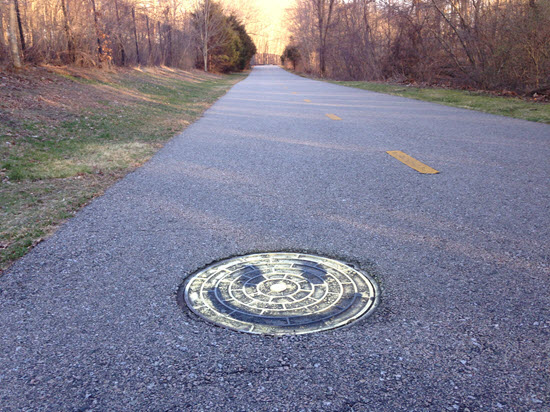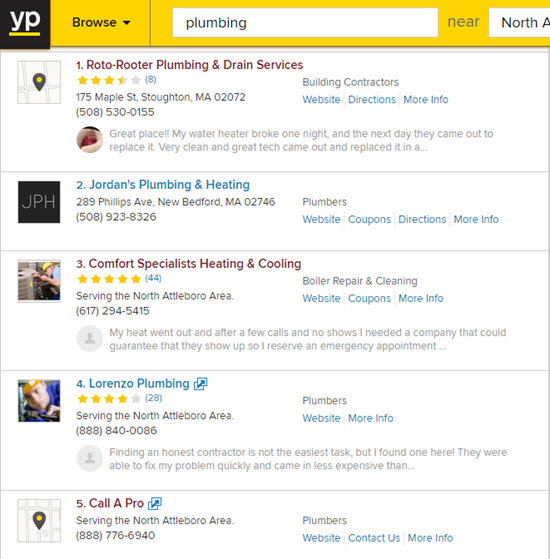Isn’t that a huge waste?
Think of how hard you worked to learn your craft, start your business, stay in business, get customers, and do a great job for them and earn those positive reviews.
That’s why it’s stupid not to ask for online reviews. That’s even stupider than Stone Cold. You’re missing half the payoff.
But isn’t it equally dumb to get reviews on sites most people ignore? When there are Big Boys like Google, Facebook, and Yelp, why on earth would you ask a happy customer to go to a YellowPages or a SuperPages or a CitySearch to write a review?
Well, there are some reasons you shouldn’t overlook the smaller, less-prominent, less-glamorous review sites. You should work them into your larger review strategy. Here’s why:
1. They corroborate your reviews on sites where it’s harder to get reviews. Let’s say you’re killing it on Google, but you look like a one-hit wonder because you’re not doing as well on Yelp. Getting reviews on other sites that rank well when you search for your business by name will make the Google reviews look less like flukes, and may make the bad Yelp reviews look more like the whiny exceptions.
2. You’ll get more review stars showing up when potential customers search for you by name. Even if they don’t click through to your YellowPages listing (for example), good reviews there add to the overall effect of, “Hey, these guys have consistently solid reviews.”

3. They’re easy backup options, for customers who don’t want to bother with Yelp or Google. Many sites even allow reviewers to log in with Facebook, rather than create a separate account just to review you on a given site. Also, Yelp and Google are the only sites that really filter reviews (Yelp much more so than Google). You don’t want to send everyone into the meat grinder.
4. You can repurpose those “easy” reviews as testimonials on your site. That is OK, even on Yelp. They won’t get filtered.

5. You can include badges on your site that link to your reviews on the overlooked review sites.
6. You’re more likely to rank well in those sites, which themselves often rank well in Google for relevant keywords. You might cultivate a little stream of non-Google referral traffic.

7. You can always ask if they’ll post the same review on another, slightly more difficult site – like Google – where you’d like more reviews. I mean, they’ve already written the thing. It’s the online-reviews equivalent of an upsell.
8. There’s a small chance that reviews on “easy” sites help your Google rankings. I don’t know one way or the other (and neither do you), so please take that comment with a grain of salt. I’m simply saying it’s possible. Stranger things have happened.

9. Those sites may become more important in the future.
10. Sometimes the alternative is to get no reviews at all.
11. Some customers might actually care about reviews on CitySearch or DexKnows or MerchantCircle.
12. As Aaron Weiche of GetFiveStars pointed out, you’ll want to create the maximum “wow” effect when customers search for the name of your business + “reviews.” For that matter, even the overlooked sites often rank well when customers search for a specific keyword + “reviews.” It’s just smart barnacle SEO.
—
Do you agree it’s worth peeling off at least a few customers to review you on sites other than the Big Boys?
What’s your favorite under-appreciated review site?
Why do you like it?
Leave a comment!

Phil- Great post and message, one I’ve been meaning to write about. I tell businesses to search their business name or brand as well as “business name + reviews” (I see that happening more and more) and look at what review sites are on page 1. Make sure you have something solid showing up on all of the page 1 SERPS. Putting all your focus on 20 great Yelp reviews when you also have a 1-star YP.com review might cost you a bit. I’m very in favor of spending your great reputation out wide.
Thanks, Aaron. Great points! I’ve added a 12th point.
If I may add to that: search for various competitors and also the business type (e.g. dentist + reviews) as well, to see which additional potential review sites show up.
Howdy, Eduard! Not sure I follow. Is this different from point #12?
Sorry Phil, totally missed point #12!
I already had the page open in a browser (hidden behind all the other windows) for over a day ‘coz I wanted to reply.
Man, you’re serious!
I’ve recently realised another set of reasons to broaden where you get reviews.
The common review systems are related to local businesses. But this is not always relevant. e.g. if you sell your services internationally. For those you want to be on sites that don’t just promote your reviews in your village.
Some of these review systems are also approved to show stars in AdWords. Another bonus.
I personally chose trustpilot for my reviews as it covers both the above.
Another consideration is to find niche review systems related to what you do. I am a partner for a certain CMS system that allows reviews on their partner pages. Sending my clients to write reviews there means future clients on that system will see a nice healthy set of ultra relevant reviews.
I’m sure many industries have niche review systems that work well. Especially in the service industries: cafes, restaurants, hotels, bars, tradies…
Good point, Tony. I’m generally not a fan of review systems, though, mostly because they’re walled gardens that have little visibility beyond brand-name searches, and because every review written there is a review not written on a site people pay more attention to (e.g. Google). But I agree they do have their utility.
Don’t forget about WordPress plugins like Rich Reviews to boost your visibility in the organic search results. You get a star rating in the non-local, pure organic SERPs that looks just like the stars that other review sites give you–except that your customers can write the review on your website, without logging in or creating an account anywhere, easy and hassle-free. On top of all that goodness, you get to moderate the reviews just like you would with comments.
Please note that I’m not advocating this as a replacement for getting reviews on proper review sites, but you can’t beat it for a visual boost in the SERPs.
The big trouble is most customers don’t see moderated testimonials as unbiased. But I do agree they have their place in the world.
Agreed. It’s just one aspect of a much larger review picture. Having some eye-catching real estate in the SERP never hurts, but you have to back it up with un-moderated reviews.
Good article. My body shop puts a big emphasis on reviews in particular Google and Yelp. Having said that, in my opinion google has made it more difficult to write a review (google + page) and yelp, if you are not an established “yelper” the review may never be published.
Which make your post so accurate. We push folks to publish reviews using their facebook log in on other sites. The bottom line is that if it is not easy to write and publish a review, then most folks will not take the time.
Thanks again for the article and for the chance to weigh in!
Thanks, Dan. Smart move on the Facebook-login sites. Often those are the difference between getting a review somewhere and not getting one at all (or frustrating the reviewer).
Judy’s Book is my favorite under-appreciated review site because along with Yelp, it powers Bing Local listings.